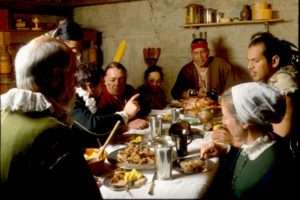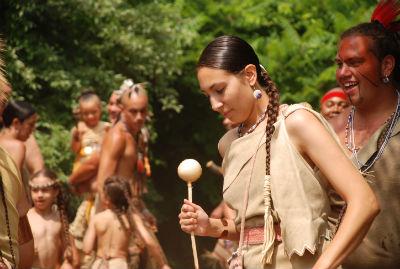It is important to understand that when we wish to study or teach another culture in a respectful and sensitive manner, it is best to learn from representatives of that ethnic group. As a Jewish early childhood educator, I hope that if our community expects sensitivity and respect for our culture, history, and traditions then we must do the same for those of other communities.

Our Rabbis celebrated the differences among people as one of the miracles of creation. Rabbi Hillel said “What is hateful to you do not do to your neighbor.” And Rabbi Akiva said, “Don’t do unto others as you would not want done to you. Every person on this planet is created in the image of the Almighty. If you don’t respect others, you don’t respect the Almighty.”
In the book, Jewish Every Day by Maxine Segal Handelman, she discusses how to approach Thanksgiving for young children on pages 288-289 of her book. She cautions against perpetuating stereotypes and how to approach Thanksgiving from a Jewish perspective without “headbands and teepees”. She discusses how to incorporate the values of Tzedakah, Chesed (kindness) and Hachnasat Orcheem (hospitality) into the holiday celebration.
Our goal should be to help children obtain accurate information about American Indians past and present in an effort to counter stereotypes. For dependable information about stereotypes and ways to choose children’s books, the National Association for the Education of Young Children recommends Oyate, a Native American website. The Oyate website says, “Do not allow children to pretend-play being Indians. This is pretending to be a member of an ethnic group of people not your own….Such behavior is insulting to real members of the group.” It concludes with a quote from a Navajo child who describes the anger and pain she feels when other children engage in such pretend play. Children should never dress up like Indians because that perpetuates a stereotype and trivializes American Indian Culture.

In addition, it is important to note that some literature, rhymes and songs have misleading portrayals of Native Americans and are offensive to their culture. Consequently, these should not be part of our curriculum. For example, research shows that the song, Ten Little Indians, dates back to 1868 and was originally called “10 Little Injuns.” It is a counting song in which the little Indians meet their deaths in a variety of ways until finally there are no more Indians. Many Native Americans believe that this song celebrates Indian genocide. Through the years it has been revised and sanitized, however because of its history and the fact that it continues to objectify Indians, it remains an offensive song to many in the Indian communities according to the Oyate website and other Native American websites.
“A Story of Survival: The Wampanoag and the English, A Thanksgiving Lesson Plan Booklet from a Native American Perspective” is the pdf link below and was prepared by the Oklahoma City Public Schools Native American Student Services. The booklet is designed to give teachers a place to begin when designing their lessons for Thanksgiving. It is written from a perspective of the Indigenous people of our country. “We want to acknowledge and recognize the Wampanoag People for being forgotten in the Thanksgiving story for so many years in our country’s education system. We hope that teachers near and far use this booklet as a jumping off point to stir their soul, creativity and skills to teach ALL children the truth about Thanksgiving”.

